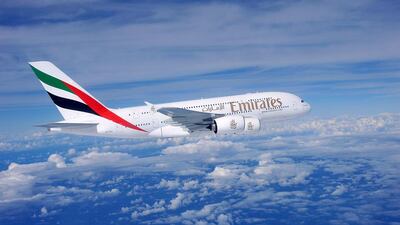Emirates, the world's biggest long-haul airline, said it would suspend flights to Nigeria from next month, after difficulties in repatriating funds from Africa's most populous nation.
The airline has tried "every avenue" to address the continuing challenges to repatriate its revenue and made "considerable efforts" to start a dialogue with the relevant authorities to intervene to find a viable solution.
"Regrettably there has been no progress," an Emirates spokeswoman said in an emailed statement. "Therefore, Emirates has taken the difficult decision to suspend all flights to and from Nigeria, effective September 1, 2022, to limit further losses and impact on our operational costs that continue to accumulate in the market."
Nigeria is withholding $450 million in payments due to foreign airlines, the biggest amount held by any single African country, the International Air Transport Association said in June.
Overall, airlines are owed $1.6 billion from 20 countries as governments seek to retain hard currency, depriving the aviation industry of cash as it emerges from the coronavirus pandemic.
Of these blocked payments, 67 per cent are stuck in 12 countries in Africa, Iata said.
Other African states withholding funds from foreign airlines include Zimbabwe with $100m, Algeria with $96m, Eritrea with $79m and Ethiopia with $75m, Iata data indicates.
Blocked remittances have plagued airlines for years, but the situation has been exacerbated by the Covid-19 pandemic that left airlines cash-strapped after two years of weak travel demand.
On August 4, Emirates said it would reduce its operations to Nigerian destinations Lagos and Abuja from August 24. The airline said at the time that if no progress was made in addressing the trapped funds issue, it would "have no choice but to take further measures".
It had planned to reduce its 11 weekly services between Lagos and Dubai to seven from August 24 and to scale down its Abuja services from five to four weekly flights from September 5.
Emirates on Thursday said at this stage the circumstances were beyond its control and it would be working to help affected customers to make alternative travel arrangements where possible.
"Should there be any positive developments in the coming days regarding Emirates’ blocked funds in Nigeria, we will of course re-evaluate our decision," the airline said. "We remain keen to serve Nigeria, and our operations provide much-needed connectivity for Nigerian travellers, providing access to trade and tourism opportunities to Dubai, and to our broader network of over 130 destinations.”
A Ministry of Aviation spokesman did not immediately respond to a request for comment by The National.
Nigeria, which earns about 90 per cent of its foreign exchange from oil, is struggling to produce due to pipeline theft and years of underinvestment.
The country's frontier market status was in jeopardy due to a shortage of US dollars, which put pressure on the naira and also led the MSCI in June to consider downgrading the MSCI Nigeria indexes to standalone markets status.
“There has been a continual and severe deterioration in the ability to repatriate funds from Nigeria,” said Craig Feldman, global head of Index Management Research and member of the MSCI Index Policy Committee. "As a result, since May 2020 a special treatment has been in place to reduce the number of potential changes in the relevant MSCI equity indexes.
“Given the prolonged nature of the issues affecting the market’s accessibility, we have put forth the consultation to reclassify the MSCI Nigeria indexes from frontier market to standalone market status.”
In 2020, a sharp drop in dollar revenue forced the Central Bank of Nigeria to devalue the currency by more than 20 per cent.


